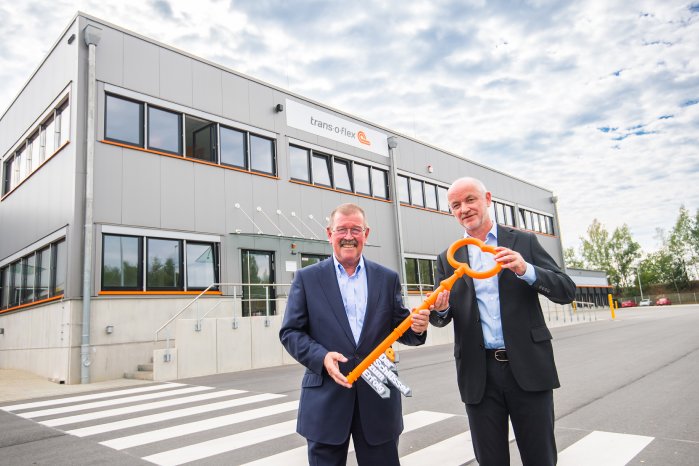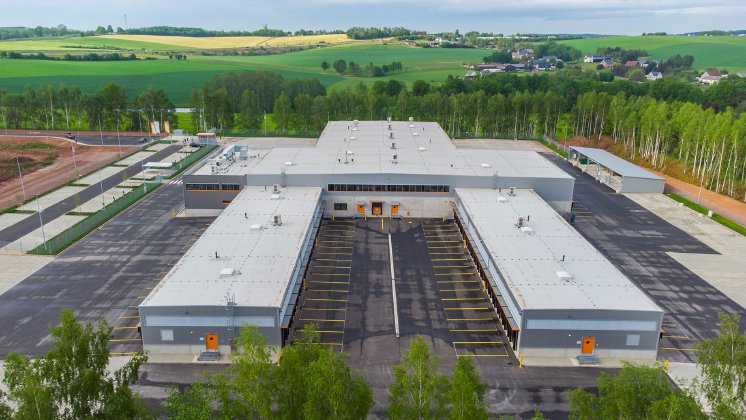- New apprenticeships and jobs: up to 150 people will work in the Expressdienst logistics centre
- Sustainable property scores with low space requirement coupled with high handling capacity, thick thermal insulation, natural cooling, rainwater infiltration and charging stations for e-vehicles
For example, it was possible to build the logistics centre in the shape of a large Y on the 30,000 square metre site in Wildenfels. With a very compact warehouse space of 5,000 square metres, this shape of facility accommodates a high number of 99 gates for fast loading and unloading. The shape also reduces the necessary traffic area to a minimum and enables fast cross-docking between long-haul trucks and delivery vehicles.
"We have invested an above-average amount in thick thermal insulation, which already reduces operating costs and climate impacts in the medium term," Albeck continues. "The temperature control of the facility, which is necessary for the safety of the sensitive goods we transport, is carried out by an eco-friendly and economically favourable combination of free cooling via supply air grilles and exhaust air fans as well as an air conditioning system." It is heated with gas dark radiators, while LED lights ensure sustainable workplace safety.
As a further investment in greater sustainability, all rain that falls on roofs and sealed surfaces of the site is not drained into the sewage system. Instead, a special pipe system has been laid under the yard surface to collect all rainwater. The pipes have valves through which the water is released in a controlled manner. "In this way, we enable natural drainage despite having developed the site," Albeck explained to the guests at the opening ceremony. "As a result, we relieve the local sewer network and the sewage treatment plant, do something against the sinking of the groundwater level and save on rainwater charges." The system is dimensioned in such a way that it can completely absorb the rainfall of a so-called once-in-a-century downpour without overflowing. As a result, the system has a balancing effect both during heavy rainfall and dry periods. To prevent tyre abrasion or oils from entering the groundwater, a lamella separator filters such substances out of the surface water before it is discharged into the environment in a controlled manner.
The centre is also prepared for increasing electromobility with charging points having been installed for employees' electric vehicles and connections being made for charging delivery vehicles. "The new generation of our delivery vehicles no longer needs diesel to keep the temperature of the storage compartments at 2 to 8 degrees or 15 to 25 degrees, but is cooled fully electrically," said Albeck. " And our fleet of company cars is being converted step by step to vehicles with electric motors."
Operationally, network efficiency has increased due to the new facility, among other things, because two previously separate sites have been merged here. Albeck: "The new branch is both a transshipment centre for our trans-o-flex ThermoMed refrigerated network with temperatures between 2 and 8 degrees Celsius and for trans-o-flex Express with non-temperature-controlled and actively temperature-controlled shipments in the ambient range of 15 to 25 degrees Celsius."
Including drivers employed by transport partners, up to 150 people will work from the site. "Because the demand for our special services is increasing, we are still expanding the workforce in all areas – whether in terms of the handling staff or in our customer service. In addition, we also offer young people a perspective who want to gain a foothold in the future industry of logistics, for example, through a sound apprenticeship as a forwarding agent or a dual study programme."
Tino Kögler, mayor of the town of Wildenfels, underlined the importance of trans-o-flex's sustainability strategy at yesterday's opening of the facility. "We are not only pleased because trans-o-flex is creating jobs and apprenticeships here in an increasingly important industry," says the 51-year-old. "Rather, trans-o-flex is very conscious of its responsibility as a logistics service provider and as a company that primarily transports pharmaceuticals and other sensitive goods. Not least during the coronavirus pandemic, it is making an important contribution to supplying the population, for example with medicines, rapid tests, disinfectants or urgently needed protective equipment. And the sustainable investments here at the site are a good example for me of how profitability and environmental protection can be combined."




